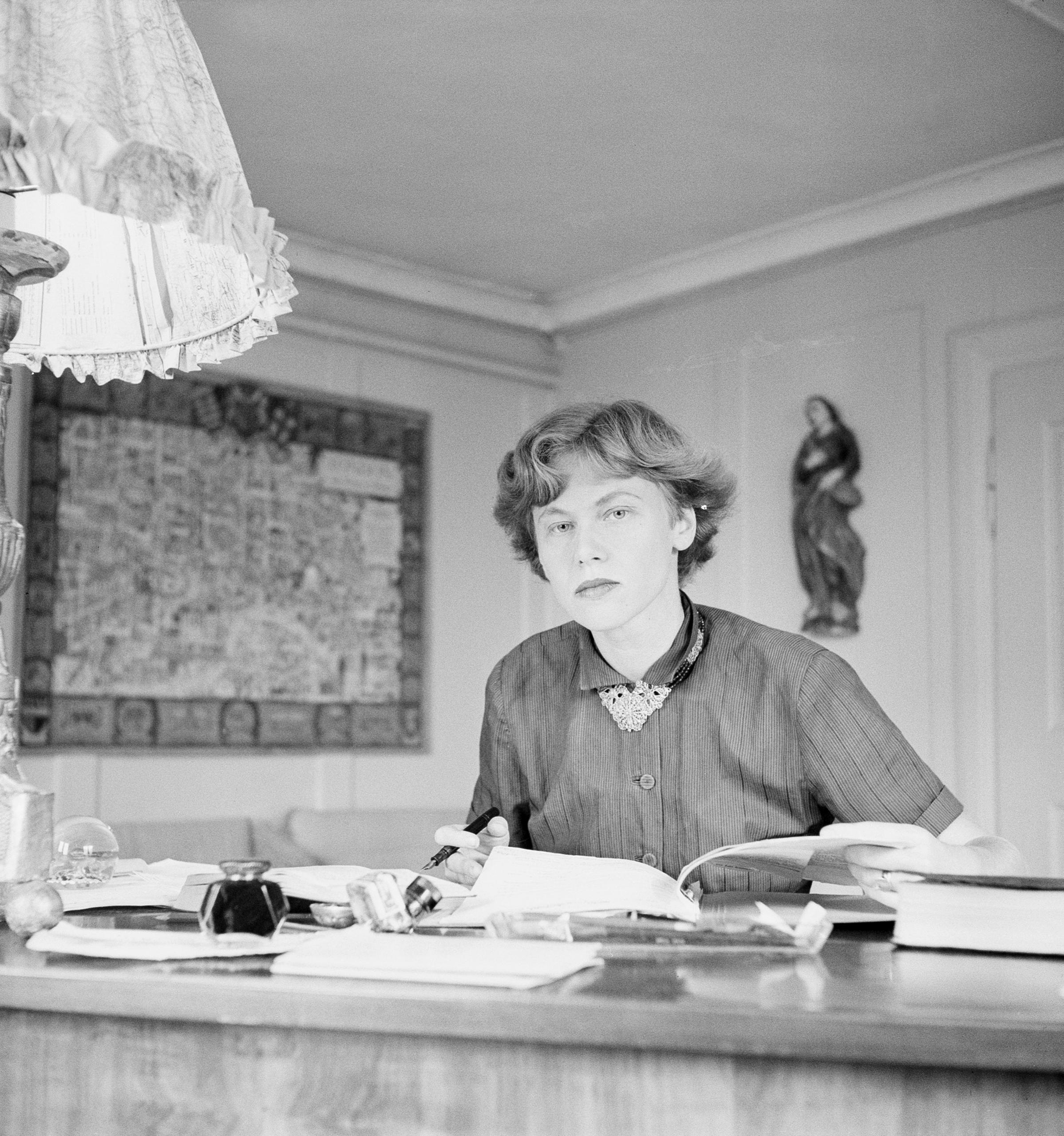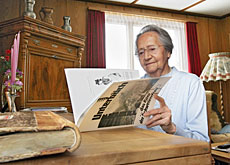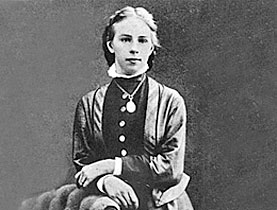“Scandalous” feminist book marks 50 years

Iris von Roten's book criticising the downtrodden status of Swiss women – and attacking male dominance – caused an uproar when it was published in 1958.
She was even held responsible for the failed vote on women’s suffrage in 1959. This year marks half a century since von Roten’s work – which has been called the missing link between Simone de Beauvoir and Betty Friedan – was published.
Her book “Frauen im Laufgitter, Offene Worte zur Stellung der Frau” (Women in the Playpen, Plain Words about the Situation of Women) was a publishing sensation. It sold out in just a few weeks – but also provoked public scorn and hatred.
“I don’t think she thought everyone would like it – it is a provocative book – but she did not expect it to be such a scandal and that her person would be attacked,” Regina Wecker, professor of women’s and gender history at Basel University, told swissinfo.
“She was an upper class woman and used to being respected.”
Von Roten was nevertheless a fairly unusual figure for post-war Switzerland. A university-trained lawyer with a doctorate, she continued working in law and in journalism after marriage and the birth of her child.
Her husband, lawyer and parliamentarian Peter von Roten, although originally from an old conservative Catholic family in Valais, western Switzerland, later became a great champion of women’s rights.
Women were expected to be wives and mothers at the time. There were very few professions open to them – von Roten was often mistaken for her husband’s secretary in their joint law office – and unlike neighbouring countries, they did not have the vote.
Empowerment
Von Roten argued in her book that political and economic empowerment, including equal pay, were key for female emancipation.
Housework, she said, was drudgery and she supported the outsourcing of much of this work, including cleaning and childcare.
She also questioned the idealisation of motherhood, saying it was often a way for men to escape their duties. Another chapter advocated women’s sexual freedom.
“Von Roten had a different tone and way of writing about these issues. She also took up sexuality and people were not used to this, especially in Switzerland, where things were a little more conservative,” said Patricia Purtschert, a philosopher working in gender studies and organiser of a recent symposium in Basel on von Roten.
This biting and incisive criticism of the patriarchal world proved too much for many male commentators.
“One can’t just go off and write a 564-page book full of bitterness that does nothing but attack the male world. That is simply unacceptable,” wrote one Basel newspaper.
Von Roten was ridiculed in public at the Basel carnival and was the subject of cartoons, including one showing her as a dominatrix with men cowering in a playpen.
Women’s reaction
The women’s movement was also unhappy about the book. Under Switzerland’s system of direct democracy, men were due to decide on granting female suffrage in 1959.
Women’s groups were advocating a “softly softly approach”. Von Roten’s book arrived like a bomb. The vote was rejected by two thirds, with many laying the blame at von Roten’s door.
“It was denied by a high proportion, but it was not her fault,” Wecker said. “The women’s movement thought that if you go to a poll you had to rely on every vote, so they tended to be more cautious.”
“They tried to show that it was not dangerous for women to have the vote and that it would not change too much.”
Von Roten’s appeal was also limited. “She was caught between a rock and a hard place because for upper class women it was not their concern and she was a traitor, and for those in the working classes, she was not one of them,” added Wecker.
Stung, von Roten withdrew from the public debate on emancipation. She took up art and later travelled abroad, although she struggled to find a publisher for her subsequent book.
Women were eventually granted the vote in 1971. By this time, attitudes had changed and there was international pressure as well.
But von Roten never lost her convictions, says Wecker, who met her once shortly before her death by suicide in 1990.
Ahead of her time?
For many, von Roten was simply ahead of her time.
“But you can ask the question who was not on time… Switzerland was a democratic state and half of the population could not vote,” Purtschert told swissinfo.
“So Switzerland was in a certain sense totally behind and she was totally on time and right to say that the situation didn’t work.”
Von Roten was actually tapping in to a swell of change that was happening underground in the 1950s.
Simone de Beauvoir’s seminal work “The Second Sex” had been published almost ten years before “Women in the Playpen” and is referenced by von Roten. The American feminist Betty Friedan’s “The Feminine Mystique”, on the dissatisfaction felt by suburban housewives, came out in 1963.
“Von Roten’s book has been called the missing link between Simone de Beauvoir and the new wave of feminist books,” Wecker said.
Von Roten rehabilitated
Despite this, the book was mostly forgotten until it was reissued after her death.
This was partly because it was so entangled with the vote, say Wecker and Purtschert, and its message became lost. The work, which still only exists in German, is also a dense and difficult read.
It is hoped that the 50th anniversary – and its associated events – will help raise awareness of the author, both in and outside academic circles.
Some of von Roten’s messages are still relevant, like how to combine work and family.
“She wanted to write something more than a study on Switzerland. She wanted to write on how patriarchy worked in Western societies, she was in England and in the United States, and she read a lot of books,” Purtschert said.
“She was really part of an international effort to rethink gender relations and she could be read as that.”
swissinfo, Isobel Leybold-Johnson in Basel
Von Roten, née Meyer, was born in Basel in 1917 into a bourgeois family, in which some female ancestors were early pioneers in women’s rights.
In 1941 she obtained a doctorate in law and began the editorship of the Swiss Women’s Journal in 1944.
She married Peter von Roten, with whom she had an intense but open relationship, in 1946. Daughter Hortensia was born in 1952.
After the scandal around her book, she withdrew from public life and travelled to Turkey and the East.
In 1988 she was injured in a road accident. This and other health issues were among the reasons she committed suicide in 1990. She wrote, “a well mannered guest must know when to get up from the table of life”.
The 50th anniversary has seen an exhibition on Iris and Peter von Roten at the Basel University Library and a symposium on her life and work. A special edition (June 2008) of the Swiss American Historical Society Review was also devoted to von Roten.
When Simone de Beauvoir’s The Second Sex was published in 1949, it scandalised conservative French society. It central idea was that “one is not born a woman, but becomes one” and was a scholarly and passionate plea for the abolition of what she called the myth of the “eternal feminine.” This seminal work became a classic of feminist literature.
Known as the “mother of American Feminism”, Betty Friedan publisher her book, The Feminine Mystique, in 1963. Friedan described what she called “the problem with no name” – the frustrations felt by educated, full-time mothers. In the 1950s, women were expected to be fulfilled by marriage and motherhood. The idea that they might want to achieve something outside this was startling.

In compliance with the JTI standards
More: SWI swissinfo.ch certified by the Journalism Trust Initiative













You can find an overview of ongoing debates with our journalists here . Please join us!
If you want to start a conversation about a topic raised in this article or want to report factual errors, email us at english@swissinfo.ch.